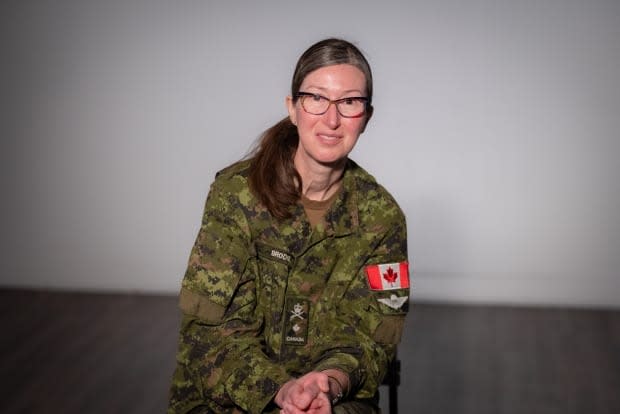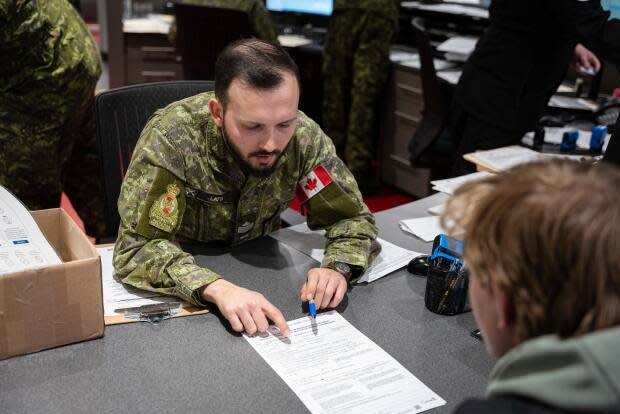Military ditching aptitude test for some applicants, will start accepting recruits with medical conditions

The military has dropped its aptitude test from the application process for dozens of jobs and plans to start accepting recruits with pre-existing medical conditions — trial efforts meant to boost the Canadian Armed Forces' dismal recruitment numbers.
Brig.-Gen. Krista Brodie, the commander overseeing military recruitment, said the new trials are meant to test out possible solutions as CAF continues to lose more people than it brings in.
"We're changing things and measuring and adjusting as we go," Brodie told CBC News. "We don't always get it right but it's moving in a positive direction."
The Department of National Defence (DND) projected in February that Canada's military could be short 15,225 people in both the regular and reserve forces by the end of the fiscal year. Defence Minister Bill Blair called the collapse in recruitment "a death spiral for the Canadian Armed Forces."
"We cannot afford to continue at that pace," he said.
That stark message came after CBC News reported Canada is falling behind on military readiness, with only 58 per cent of the military able to respond if called upon in a crisis by NATO allies. Blair said the forces have to come up with "creative" solutions to the personnel shortfall.
WATCH: Leaked documents warn Canada's military readiness is decreasing
Among its new initiatives to turn around recruitment numbers, the military is looking to eliminate two potential barriers. All recruits must now meet a single medical standard that may be too rigid, Brodie said, while the aptitude test also may be holding people back.
About 60 per cent of people who express interest in joining the forces either fail to book their aptitude test or don't show up to write it, Brodie said.
"What we've come to appreciate is that the [Canadian Forces Aptitude Test] itself may be a barrier to processing," she said in December.
The Canadian Armed Forces Aptitude Test (CFAT) is an hour-long multiple-choice test that scores people on their verbal skills, spatial ability and problem-solving. It must be completed in-person on a computer at a recruitment office or military site and is meant to give military career counsellors a sense of which jobs would best suit new recruits.
Until recently, the test was mandatory for all applicants.
The military initially tried allowing recruits with lower scores to join the ranks — a change Brodie said "didn't make a discernible difference" to recruitment.

In mid-December, the military launched a new trial — exempting 20 non-commissioned roles and 27 direct-entry officer posts from the aptitude test requirement. The exempt jobs range from ordinary sailor to intelligence officer.
DND says that, to be eligible to apply without writing the aptitude test, applicants must have university degrees or college diplomas, "meet ideal educational requirements for their selected occupations, or ... have relevant education, work and life experience."
'We should see an influx,' recruiter says
Ottawa-based military recruiter Sgt. Cynthia St-Jean said some people simply "don't like tests" and she believes this change can help.
"We should see an influx, I believe," she said. "I think there will be more people comfortable to come in and put in the application while skipping the test portion of things."
DND says that since the trial launched last year, almost 1,350 applicants have chosen to take part and their processing times have been reduced by about 45 per cent.
Brodie said applicants exempted from taking the test will still have to take it later, during basic training. The tests will be used to gather data but the information will have no bearing on individuals' careers, DND said.
Brodie said the department also is working on allowing applicants to complete their aptitude tests at home on their smartphones, but that measure is at least a year away.
Applicant says peanut allergy made him ineligible
Later this spring or in the early summer, the military is expected to launch a second trial that will attempt to boost recruitment by easing up on medical requirements.
Right now, everyone joining the forces in any capacity must meet a single set of medical standards. Brodie said that system was relevant decades ago but it's time for it to change.
"We know that many, many people can serve fully in the CAF with low-risk medical employment limitations that right now would be screened out because of …our common enrolment medical standard," she said.

One young man who applied to join the infantry last year told CBC News that while he passed the aptitude test with high scores, he was told he was ineligible to serve because he was diagnosed with a peanut allergy when he was a child.
"[The recruitment officer] asked me if I have any allergies. I said 'peanuts,' thinking there'd be absolutely nothing wrong with that because it's one of the most common allergies," said the applicant. "He kind of just stopped and went, 'Oh that's a disqualifying factor.'
"I was a little taken aback ... I really want to serve my country."
WATCH/ Military recruitment process 'can be improved', defence minister says
The applicant asked not be named, saying he fears it could jeopardize his chances when he re-applies. He said the military told him he could repeat his allergy test or start eating a small amount of peanut butter daily to see if he can rid himself of the allergy. He said he plans to try.
DND told CBC News that people with peanut allergies are at risk of potentially life-threatening allergic reactions and "would generally not be considered compatible with the tasks required of all CAF members." The department said each case is assessed on its own merits.
Brodie said her section and the Canadian Armed Forces Health Services have been working together on the issue for a year. She said the goal is to give medical teams at recruiting offices the authority to clear people with medical issues to serve on a case-by-case basis.
Changes to medical screening
DND said that in order to be eligible for this new initiative, an applicant's "medical condition must not prevent the recruit from the physical demands of the trade they are applying for." Applicants under the initiative also will be given medical employment limitations once they're enrolled, the department said.
When asked if the military is considering allowing in people with allergies, or those taking medication for mental health issues like anxiety or depression, Brodie said such decisions will be made on a case-by-case basis.
"Whether that's medication for anxiety, whether it's allergies, whether it's ADHD, whether it's celiac, all of those key areas of concerns that have been raised to our attention are ones that we're looking at closely," she said.
Blair called the two new trials an "excellent first step, but I think there's more that needs to be done."
"I think we've really got to look at all the innovative ways, creative ways that we can attract the very best and brightest in Canada. It's important," Blair said last week.
In a statement, the defence department said an interdisciplinary group that started its work last year is continuing to "explore and trial innovative ways to make the recruiting process as efficient as possible."

